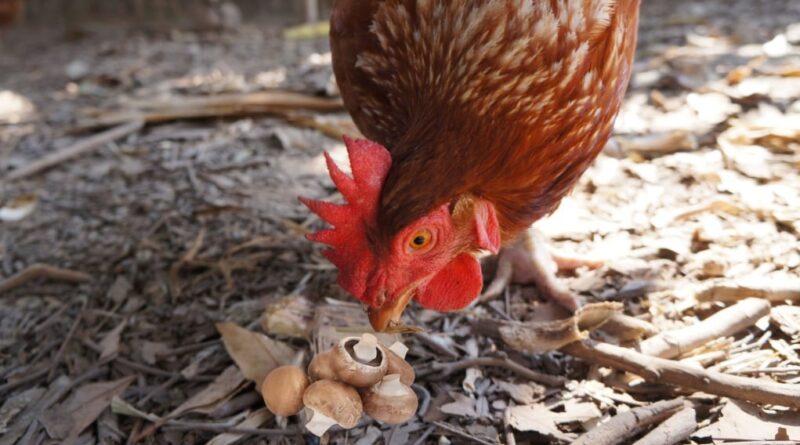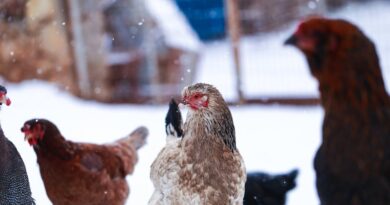Can Chickens Eat Mushrooms? A Complete Guide to Safe Feeding Practices
Chickens are curious creatures, often pecking at anything that catches their attention. As a responsible chicken owner, it’s natural to wonder if certain foods, like mushrooms, are safe for your flock. This comprehensive guide explores the safety, nutritional benefits, and risks of feeding mushrooms to chickens, ensuring you make informed decisions for their health and well-being.
Understanding a Chicken’s Diet
Before diving into whether chickens can eat mushrooms, it’s essential to understand their dietary needs. Chickens thrive on a balanced diet of:
- Layer pellets or crumbles: A staple diet rich in proteins, vitamins, and minerals.
- Grains and seeds: Corn, wheat, and sunflower seeds are common supplements.
- Vegetables and fruits: A variety of fresh produce for added nutrients.
- Protein-rich treats: Mealworms, cooked eggs, and certain dairy products.
- Foraging materials: Grass, weeds, and insects found during free-ranging.
While chickens can eat many foods, some items are toxic and can harm their health. Let’s explore where mushrooms fit into this equation.
Are Mushrooms Safe for Chickens?
The answer depends on the type of mushroom. Edible mushrooms, such as those commonly found in grocery stores, are generally safe for chickens. However, wild mushrooms are a different story, as many species are toxic and can pose severe health risks.
Types of Mushrooms and Their Safety for Chickens
1. Safe Mushrooms for Chickens
Chickens can safely eat most edible mushrooms, such as:
- White Button Mushrooms: Mild and rich in nutrients.
- Portobello Mushrooms: A good source of protein and vitamins.
- Shiitake Mushrooms: High in antioxidants and dietary fiber.
- Oyster Mushrooms: Packed with essential minerals like potassium and iron.
2. Toxic Mushrooms to Avoid
Wild mushrooms can be highly toxic. Some dangerous varieties include:
- Amanita Species (e.g., Death Cap, Destroying Angel): Extremely poisonous and potentially fatal.
- False Morels: Can cause gastrointestinal distress and neurological issues.
- Jack-o’-Lantern Mushrooms: Bright orange and highly toxic.
Nutritional Benefits of Mushrooms for Chickens
Edible mushrooms offer several health benefits for chickens when fed in moderation:
- Rich in Vitamins: Mushrooms are a great source of vitamins B2, B3, and D, which support energy metabolism and immune health.
- High in Protein: Essential for muscle development and egg production.
- Antioxidants: Help combat oxidative stress and boost overall immunity.
- Dietary Fiber: Supports healthy digestion.
Potential Risks of Feeding Mushrooms to Chickens
Even edible mushrooms should be given cautiously. Here are some risks to consider:
- Overconsumption: Feeding too many mushrooms can disrupt their balanced diet.
- Digestive Issues: Chickens may struggle to digest mushrooms if they are raw or too fibrous.
- Wild Mushroom Poisoning: If chickens free-range, they might consume toxic wild mushrooms accidentally.
How to Safely Feed Mushrooms to Chickens
To minimize risks and maximize benefits, follow these steps when introducing mushrooms to your flock:
1. Choose Edible Varieties
Purchase mushrooms from reputable sources like grocery stores or farmers’ markets. Avoid feeding wild mushrooms unless you are 100% sure of their safety.
2. Prepare the Mushrooms
- Wash thoroughly: Remove any dirt, pesticides, or potential contaminants.
- Cook lightly: Cooking mushrooms makes them easier to digest and enhances their nutritional profile. Avoid adding salt, oil, or spices.
3. Cut into Small Pieces
Chickens don’t chew food like humans. Cutting mushrooms into small pieces prevents choking and aids digestion.
4. Introduce Gradually
Start with small portions to ensure your chickens accept the new food and do not experience adverse reactions.
5. Observe Your Flock
After feeding mushrooms, monitor your chickens for signs of distress, such as vomiting, lethargy, or changes in behavior. If these occur, consult a veterinarian immediately.
What to Do if Chickens Eat Toxic Mushrooms
If you suspect your chickens have consumed wild mushrooms, take the following steps:
- Identify the Mushroom: Take a sample of the mushroom for identification.
- Separate the Affected Chicken: Isolate the bird to prevent further exposure.
- Contact a Veterinarian: Provide details about the mushroom and any symptoms.
- Provide Supportive Care: Offer plenty of water and a nutrient-rich diet to help flush toxins.
Alternatives to Mushrooms for Treating Chickens
If mushrooms aren’t readily available or you prefer not to feed them, consider these alternatives:
- Vegetables: Carrots, spinach, and zucchini.
- Fruits: Apples, bananas, and berries.
- Protein Treats: Mealworms or boiled eggs.
- Grains: Cooked rice or oats.
FAQs About Chickens and Mushrooms
1. Can chickens eat raw mushrooms?
Yes, but cooked mushrooms are easier to digest and safer for chickens.
2. Are all store-bought mushrooms safe for chickens?
Most store-bought mushrooms are safe, but avoid feeding exotic or unfamiliar varieties without proper research.
3. Can chickens eat mushroom stems?
Yes, mushroom stems are safe as long as they are from an edible variety.
4. What happens if a chicken eats a toxic mushroom?
Symptoms may include vomiting, diarrhea, or neurological issues. Immediate veterinary care is crucial.
Tips for Keeping Chickens Safe from Wild Mushrooms
- Regular Foraging Inspections: Check your free-ranging area for toxic mushrooms and remove them promptly.
- Educate Yourself: Learn to identify common toxic mushrooms in your region.
- Supervise Free-Range Time: Monitor your flock while they forage to prevent accidental ingestion.
Conclusion
Chickens can safely eat many edible mushrooms, such as white button or portobello mushrooms, when prepared and fed correctly. However, wild mushrooms pose significant risks and should always be avoided. By understanding the nutritional benefits and potential hazards, you can make informed decisions that keep your flock happy and healthy.
Always introduce new foods gradually, monitor your chickens for any adverse reactions, and consult a veterinarian if needed. With proper care and attention, mushrooms can be a nutritious addition to your chickens’ diet
Creative Ways to Incorporate Mushrooms into a Chicken’s Diet
If you’re looking to add variety to your chickens’ diet with mushrooms, try these creative ideas:
1. Mix with Scrambled Eggs
Chop cooked mushrooms into small pieces and mix them with scrambled eggs. This protein-packed treat is excellent for chickens, especially during molting season.
2. Add to a Vegetable Medley
Combine cooked mushrooms with other chicken-safe vegetables like carrots, peas, and zucchini for a nutrient-dense snack.
3. Mash with Grains
Mash cooked mushrooms into cooked rice or oats. This creates a soft, easy-to-eat meal that your chickens will enjoy.
4. Create Mushroom Treat Balls
Blend mushrooms with seeds and mealworms, form into small balls, and let them dry. These make great occasional treats for your flock.
Mushrooms and Chickens—A Balanced Approach
Feeding mushrooms to chickens can be a healthy addition to their diet when done thoughtfully. Edible mushrooms offer valuable nutrients that can complement their primary feed, but moderation and proper preparation are key to ensuring their safety and health.
While introducing mushrooms, always prioritize their well-being by avoiding wild varieties and monitoring their response to the new food. By following these guidelines, you’ll provide your chickens with a safe and enjoyable feeding experience, keeping your flock thriving and happy




